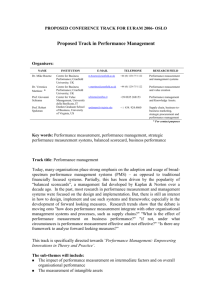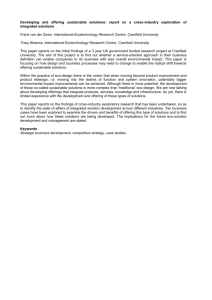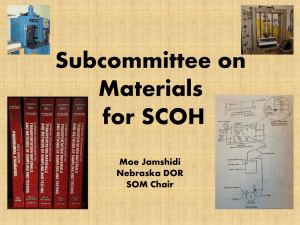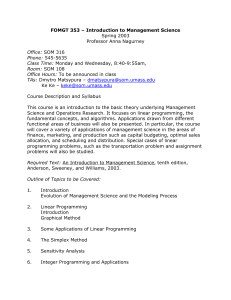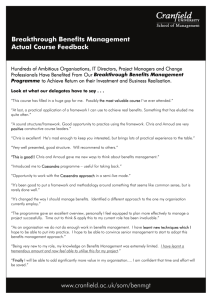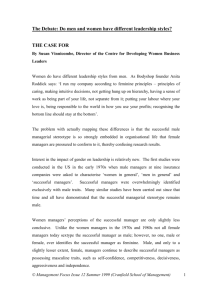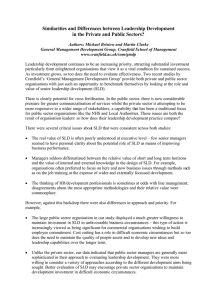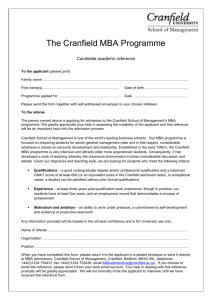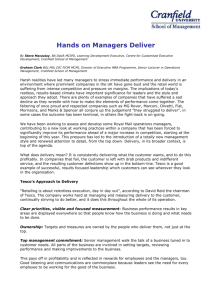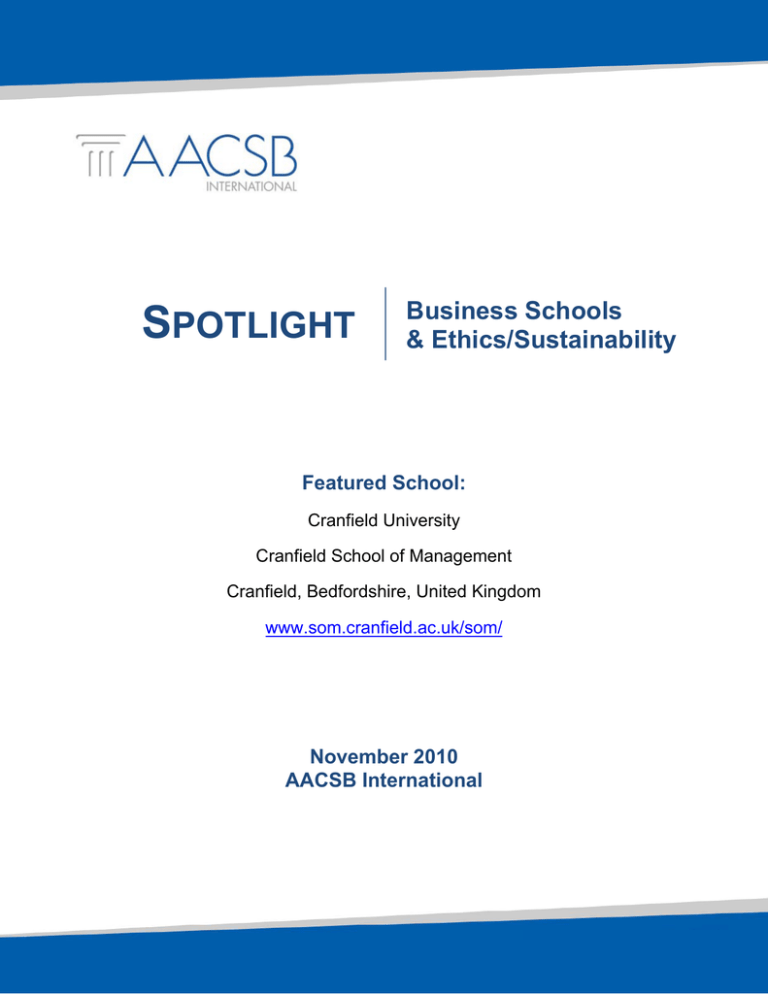
SPOTLIGHT
Business Schools
& Ethics/Sustainability
Featured School:
Cranfield University
Cranfield School of Management
Cranfield, Bedfordshire, United Kingdom
www.som.cranfield.ac.uk/som/
November 2010
AACSB International
SPOTLIGHT | Business Schools & Ethics/Sustainability
Cranfield University | 2
Cranfield School of Management (SOM)
As a founding member of the European Academy of Business in Society (EABIS)1, and signatory of the
UN Global Compact’s Principles for Responsible Management Education (PRME), the Cranfield School of
Management (SOM) and its faculty have long been engaged in developing research and pedagogy in the
areas of sustainability and corporate responsibility. The School’s Director, Professor Frank Horwitz, chairs
the SOM’s PRME taskforce, and considers embedding PRME into the culture, curricula, and everyday
practices of the school fundamental to the success of the SOM, ensuring that they are an integral part of
the School’s mission and not just “bolted on2.” Séan Rickard, the Full-Time MBA Director has said that
Cranfield SOM takes “responsible management education very seriously and have ensured that all our
student activities - whether in the classroom, in dealing with companies or the wider community - embrace
core principles such as ethics, social awareness and sustainability.”
The Doughty Centre for Corporate Responsibility
A major contributor to this objective is the Doughty Centre for Corporate Responsibility. Hosted by the
Cranfield SOM, the Centre is devoted to creating and disseminating the tools through which current and
future managers can make corporate responsibility and sustainability issues central to the business
strategy of their organizations. Since its founding in 2007, the Doughty Centre has taken the SOM’s focus
on these issues to a new level, operating in several directions to ingrain in Cranfield students the
necessity for business to make a positive impact on global society.
The Doughty Centre for Corporate Responsibility is funded primarily through a £3 million donation made
in 2006 by Cranfield alumnus Nigel Doughty3, co-founder and co-chairman of Doughty Hanson & Co., a
private equity firm headquartered in London, and with offices throughout Europe. David Grayson, CBE,
Professor of Corporate Responsibility and Director of the Doughty Centre for Corporate Responsibility,
describes Mr. Doughty as “very committed to active citizenship,” a person who makes sustainability and
corporate responsibility central to his business strategy, and who desired to promote that mindset through
the donation to his alma mater. Though careful to point out that the Centre does not operate as a
consultancy service, Professor Grayson notes that faculty of the Centre also bring in some funds through
consulting work for corporate clients. This, he says, also has the added benefit of granting Centre faculty
greater understanding of the requirements for, and benefits of, successful sustainability strategies in real
business environments.
Conducting research, be it for corporate clients or independently, is only one of the ways in which the
Doughty Centre contributes to the Cranfield SOM’s objective to inculcate their students with practical
knowledge and awareness of environmental, social, and governance (ESG) issues. An equally important
role involves the development of opportunities for Cranfield students themselves to gain exposure to and
explore such issues directly. In pursuit of this role, the Doughty Centre has, like the SOM itself, focused
primarily on the development of materials and courses for the MBA program curriculum.
SOM Curricula: Instilling the Mindset
As the MBA is the flagship academic program of the Cranfield SOM, the faculty have focused primarily,
though not exclusively, on using the MBA curriculum as a vehicle through which to reinforce the mindset
of corporate responsibility in their students. From the beginning of their time at the Cranfield SOM, MBA
students are exposed to ESG issues such as sustainability and corporate responsibility. During the
orientation week, for example, SOM faculty stage a debate in which they argue different points of view on
© AACSB International. All Rights Reserved.
SPOTLIGHT | Business Schools & Ethics/Sustainability
Cranfield University | 3
the role of sustainable business practices and corporate responsibility. According to Professor Grayson,
the debate serves three fundamental purposes: (1) raising students’ awareness of the complexities of
these issues; (2) signaling that a multiplicity of valid yet differing viewpoints on the topic exist, and (3)
reinforcing a philosophy that the professors expect and welcome challenges to their own views in the
classroom.
All incoming students also receive a booklet introducing them to the topic of corporate responsibility and
listing issues that relate to various functional areas of business that will be explored within their program.
The lists serve as a supplemental “primer” for students interested in engaging their professors and fellow
classmates in a deeper discussion of corporate responsibility and sustainability throughout the program.
Additionally, course instructors have been asked to describe the ways in which sustainable development
will impact the subject they teach. The core Organisational Behaviour and Personal and Professional
Development (OBPPD) module, for example, which is the only course that lasts the length of the yearlong MBA program, now includes as one of its learning outcomes the development of “critical awareness
of cultural, political and ethical similarities and differences and an awareness of the environment within
which organisations operate4.”
Students interested in incorporating a deeper focus on corporate responsibility may choose to take
advantage of several options available in the second half of the MBA program. During the last two terms,
students select a series of “elective themed modules” that enable them to customize the MBA program
according to their own interests and career goals. The Sustainable Business module5, taught by Doughty
Centre faculty, is specifically aimed at students wishing to learn how to incorporate sustainable and
responsible practices into every aspect of their organizations. Another elective opportunity is an
independent consulting project that will allow the student to confront issues of sustainability and corporate
responsibility in the setting of a real business organization6. Interested students can call upon the
Doughty Centre for help identifying an appropriate project7.
In addition, MBA students are also required to complete a week-long International Business Experience
(IBE) trip. Several of the available destination and project options provide direct exposure to ESG issues.
For example, part of the MBA cohort that graduated in 2010 went to the West African nation of Burkina
Faso and worked to help increase the marketing ability of a co-operative of local artisans, while another
part learned firsthand about Brazil’s “Waste Picker Community,” and how they were able to transform
their profession into a business with support from government and local agencies8. Professor Grayson
personally led the 2010 IBE trip to China, and says that doing so allowed him a valuable opportunity to
showcase corporate responsibility in the Chinese context.
Other programs at the Cranfield SOM are also exploring where corporate responsibility can be effectively
embedded in what is already taught. The Master of Science in Strategic Marketing degree has a core
module dealing with ethical and sustainability issues as they relate to the practice of marketing. The SOM
offers an open-enrollment non-degree executive education program on “Leading Sustainable
Organisations.” And some doctoral students also choose to pursue their research in the field, particularly
under the aegis of the Doughty Centre9.
Beyond Curricula: Reinforcing the Mindset
In addition to championing the incorporation of the PRME into the Cranfield SOM curricula10, the Doughty
Centre also sponsors a number of other extracurricular initiatives. The Cranfield Corporate Responsibility
Network (CCRN), hosted by the Doughty Centre, is an open forum for faculty, students, alumni, and
© AACSB International. All Rights Reserved.
SPOTLIGHT | Business Schools & Ethics/Sustainability
Cranfield University | 4
others. Professor Grayson says CCRN meetings are held on a monthly basis, and often bring in visiting
speakers from academia, business, and NGOs to explore corporate responsibility issues with the
attendees. Other meetings provide a platform for Cranfield students and faculty to present their research
and test out ideas11.
According to Professor Grayson, the CCRN and the applied research generated by the Doughty Centre
not only aids companies wishing to engage their employees in embedding corporate responsibility in their
organizational strategy, but also becomes the foundation for useful instructional material at the SOM. He
says that though the primary target of Doughty Centre research is the company for which it is done, either
through consulting work or customized executive education programs, such work also serves to develop
material for traditional MBA and other program courses.
In 2009, the Doughty Centre joined Oxford University’s Said Business School, the London Business
School, and the philanthropic London-based Pears Foundation, in the Pears Business School
Partnership12. This collaboration presents annual lectures and generates case studies in support of
developing the understanding and commitment of business students to public service, philanthropy, and
other forms of active citizenship. Professor Grayson says that the work of the Pears Business School
Partnership nicely complements the Doughty Centre’s individual efforts to generate applied research on
ESG issues.
The Doughty Centre also supports students and student-led initiatives that embrace the issues it
champions. The Centre provides modest travel funds for students to attend conferences and competitions
related to corporate responsibility, such as CEIBS’ annual Being Globally Responsible Conference in
Shanghai13, or IESE Business School’s Doing Good and Doing Well Conference in Barcelona14.
Professor Grayson notes that the Cranfield SOM’s chapter of Net Impact was encouraged by Doughty
Centre faculty. Finally, the Doughty Centre has worked in previous years to find post-MBA career options
in the field of corporate responsibility for Cranfield students. According to Professor Grayson, for the
coming year’s cohort of students, the Centre will begin to coordinate these efforts with the SOM’s Career
Services Centre, since more and more students are evidencing interest in such careers.
Acknowledgements: AACSB International is grateful for the assistance of David Grayson, CBE, Professor
of Corporate Responsibility and Director of the Doughty Centre for Corporate Responsibility, and Nadine
Exter, Manager of the Doughty Centre for Corporate Responsibility.
© AACSB International. All Rights Reserved.
SPOTLIGHT | Business Schools & Ethics/Sustainability
Cranfield University | 5
End Notes
1
European Academy of Business in Society. (2010) Founding Partners web page. Electronic document, http://www.eabis.org/about‐eabis/founding‐partners.html, accessed October 26, 2010. 2
Horwitz, Frank, and David Grayson. (2010) Putting PRME into practice in a business school. Global Focus, Vol. 4, No. 2, P. 26. Electronic document, http://www.som.cranfield.ac.uk/som/dinamic‐
content/media/horwitz%20grayson%20prme%20article.pdf, accessed October 27, 2010. 3
Cranfield School of Management. (2006) Doughty donation to fund new academic Centre. Forum, the monthly newsletter of Cranfield SOM, June 2006, Issue 156. Electronic document, http://www.som.cranfield.ac.uk/som/dinamic‐content/news/documents/forum0606.pdf, accessed October 26, 2010. 4
Cranfield School of Management. (2010) Core Modules: Organisational Behaviour and Personal and Professional Development web page. Electronic document, http://www.som.cranfield.ac.uk/som/p12380/Programmes‐and‐
Executive‐Development/MBA/Your‐MBA‐programme/The‐Cranfield‐MBA‐Core‐modules‐Organisational‐
Behaviour‐and‐Personal‐and‐Professional‐Development‐Part‐one, accessed October 28, 2010. 5
Cranfield School of Management. (2010) Elective Themed Modules: The Sustainable Business web page. Electronic document, http://www.som.cranfield.ac.uk/som/p12517/Programmes‐and‐Executive‐
Development/MBA/Your‐MBA‐programme/The‐Cranfield‐MBA‐Elective‐themed‐modules/The‐Sustainable‐
Business, accessed October 28, 2010. 6
Cranfield School of Management. (2010) Elective Themed Modules: Independent Projects web page. Electronic document, http://www.som.cranfield.ac.uk/som/p13171/Programmes‐and‐Executive‐Development/MBA/Your‐
MBA‐programme/The‐Cranfield‐MBA‐Elective‐themed‐modules/independent‐projects, accessed October 29, 2010. 7
Doughty Centre for Corporate Responsibility. (2010) Student Project Ideas web page. Electronic document, http://www.som.cranfield.ac.uk/som/p9355/Research/Research‐Centres/Doughty‐Centre‐for‐Corporate‐
Responsibility/Student‐Project‐Ideas, accessed November 3, 2010. 8
Cranfield School of Management. (2010) International Business Experience web page. Electronic document, http://www.som.cranfield.ac.uk/som/p3400/Programmes‐and‐Executive‐Development/MBA/your‐mba‐
programme/The‐Cranfield‐MBA‐International‐Business‐Experience, accessed November 3, 2010. 9
Doughty Centre for Corporate Responsibility. (2010) Doctoral Opportunities web page. Electronic document, http://www.som.cranfield.ac.uk/som/p9354/Research/Research‐Centres/Doughty‐Centre‐for‐Corporate‐
Responsibility/Doctoral‐Opportunities, accessed October 28, 2010. 10
Horwitz, Frank, and David Grayson. (2010) Putting PRME into practice in a business school. Global Focus, Vol. 4, No. 2, P. 28. Electronic document, http://www.som.cranfield.ac.uk/som/dinamic‐
content/media/horwitz%20grayson%20prme%20article.pdf, accessed October 27, 2010. 11
Doughty Centre for Corporate Responsibility. (2010) Cranfield Corporate Responsibility Network web page. Electronic document, http://www.som.cranfield.ac.uk/som/p9352/Research/Research‐Centres/Doughty‐Centre‐
for‐Corporate‐Responsibility/Cranfield‐Corporate‐Responsibility‐Network, accessed October 29, 2010. 12
Cranfield School of Management. (2009) The Pears Business School Partnership. Press release, June 5, 2009. Electronic document, http://www.som.cranfield.ac.uk/som/dinamic‐
content/media/Pears%20Business%20Schools%20Partnership%20Announcement%20‐050609.pdf, accessed October 29, 2010. 13
China Europe International Business School. (2010) CEIBS Hosts 5th Annual Being Globally Responsible Conference, “Inspire, Innovate, Implement.” Electronic document, http://bgrc.ceibs.edu/newssingle/CEIBS%20Hosts%205th%20Annual%20Being%20Globally%20Responsible%20Co
nference.html, accessed November 3, 2010. 14
IESE Business School. (2010) Doing Good and Doing Well Conference web page. Electronic document, http://dgdw.iese.edu/, accessed November 3, 2010. © AACSB International. All Rights Reserved.

